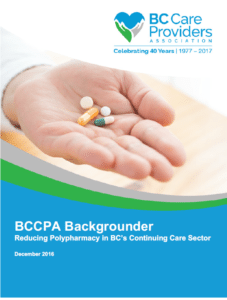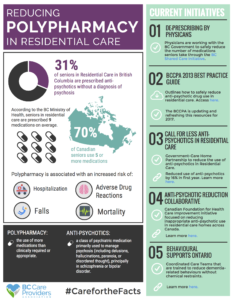New paper addresses use of Polypharmacy, Antipsychotics, Anti-depressants and off-label drug use

Lately we have seen concerns raised about seniors being prescribed too many unnecessary prescription drugs – a practice commonly referred to as polypharmacy. In general, the BC Care Providers Association (BCCPA) agrees with the Office of the Seniors Advocate (OSA) that seniors taking many drugs at the same time, often referred to as polypharmacy, should be minimized as much as possible. The BCCPA also agrees that the over-use of medication by seniors is a significant challenge for aging adults, not just residential care.
While there is evidence in BC that some residents receiving care in long term care are overly medicated there is generally no supporting evidence that this is largely attributable to residential care homes themselves. In particular, the literature outlines that the reasons for polypharmacy are a result of the following factors largely attributable to physician prescribing practices, including, but not limited to:
- Physicians believe there is appropriate evidence for prescribing the medications;
- Physicians are reluctant to change orders for medications started by specialists and/or feel they lack the education and experience to reduce or stop medications; and
- Physicians voice concerns that patients will feel the physician is giving up on them or leading them to quicker deaths.
While physicians are generally responsible for prescribing medications all health care providers have a role in dealing with polypharmacy and ensuring appropriate prescribing. For example, pharmacists also play a critical role in ensuring medications prescribed to seniors are appropriate and safe. The BCCPA supports pharmacists in reducing polypharmacy among older adults including, where appropriate, the provision of enhanced geriatric training.

Ensuring proper documentation of medications, including outlining reasons for usage is properly documented, is critical. For example, if a diagnosis of depression is what necessitates the prescription of anti-depressants, this should be clearly documented. While providers are attempting to deal with this, more should continue to be done in this regard including development of appropriate information and monitoring systems.
As outlined in detail in the BCCPA Polypharmacy backgrounder, BC and Canada have seen major reductions in the use of antipsychotics in long term care. This is also demonstrated by recent reports over the last couple of weeks from the Canadian Institute for Health Information (CIHI) and the BC Office of the Seniors Advocate (OSA). In late November, for example, CIHI reported that in Canada that the potentially inappropriate use of antipsychotics in long term care decreased from 32.5% in 2011–12 to 23.9% in 2015–16. In the OSA report also from late November it shows a decrease of 14.2% in the potentially inappropriate use of antipsychotic drugs in residential care between 2013/14 and 2015/16 for BC.
- Click here to download the full pdf version of the BCCPA’s Reducing Polypharmacy in B.C.’s Continuing Care Sector backgrounder
- Click here to read this analysis by BCCPA Director of Research and Policy Michael Kary: Reducing Polypharmacy among BC Seniors
- Click here for a PDF version of the Reducing Polypharmacy infographic




